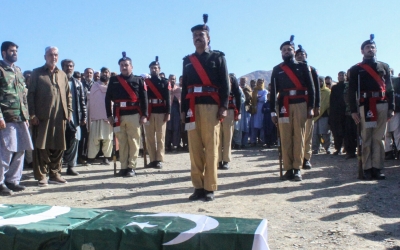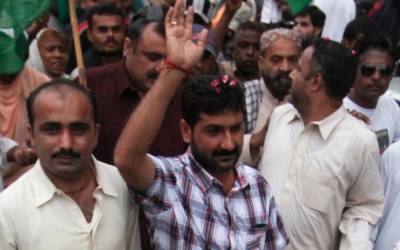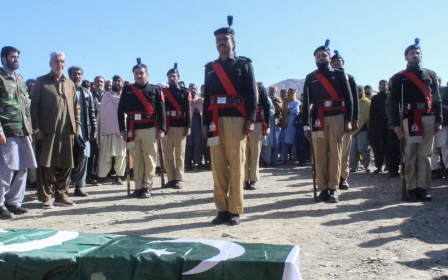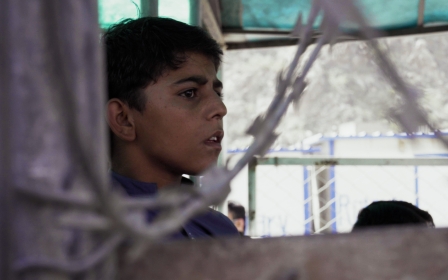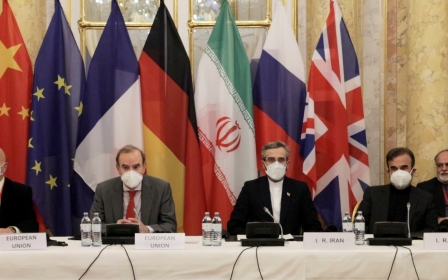Saudi pressure prompts Pakistan to get tough with Iran
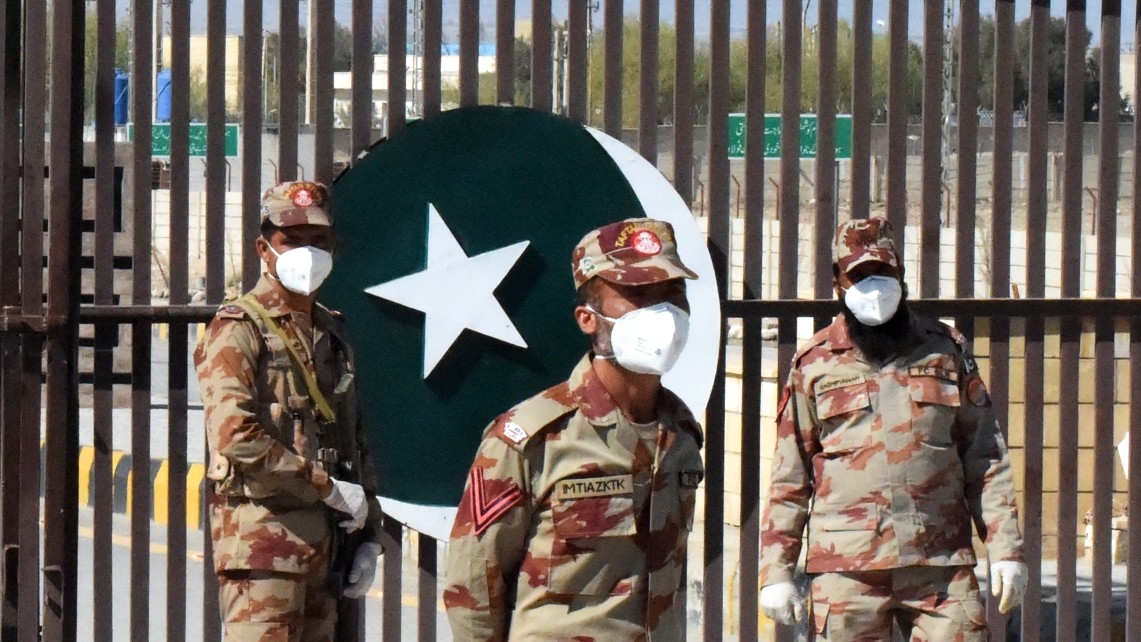
Just days after Saudi Arabia's interior minister, Prince Abdulaziz bin Saud bin Naif, visited Pakistan armed with a list of demands from the Gulf kingdom, Islamabad sent its top spy to Tehran with a message: stop supporting proxy groups in the region, or else.
The message prompted a visit to Pakistan from Iran’s own interior minister, Ahmad Vahidi. The visit, which concluded on 16 February, included meetings with Pakistani Prime Minister Imran Khan, army chief Qamar Bajwa, and Vahidi’s opposite number, Sheikh Rashid Ahmed.
The tone taken by the Iranian delegation, which included the head of the border guards and other high-ranking officials, was conciliatory, said Umer Karim, visiting fellow at the Royal United Services Institute.
"The message was to the effect that if Iran doesn't stop providing a base for Baloch separatists and funding other proxies in the region, then Pakistan can reply in kind," Karim told Middle East Eye.
Militants and proxies
On 2 February, militants from the Baloch Liberation Army (BLA) launched twin assaults on the bases of Pakistan's Frontier Corps, leading to days of fighting in the Pakistani province of Balochistan.
Some Baloch separatists, who have long fought for a Balochistan independent of both Pakistan and Iran, are believed to have established bases in Iran, from which they mount attacks on Pakistan.
Islamabad's dissatisfaction at this state of affairs has helped Saudi attempts to undermine Iran in the region, with the Gulf kingdom also looking to battle Iranian influence.
One of Riyadh's main demands from Islamabad, Karim said, was to press Iran to stop recruiting young Shia men from Pakistan to fight for its interests, as has happened in Syria.
The Saudis fear that Pakistani fighters could now be trained and sent to replenish depleted Houthi forces in Yemen.
That pressure has pushed Iran to turn elsewhere, with Tehran said to be looking to recruit Shia men from Iraq to join the Houthis.
Pakistan acts on Iranian assets
Pakistani intelligence has apprehended a substantial number of Iranian assets within the country, including a senior bureaucrat.
"The timing of this is obviously crucial: the Pakistanis would have known of this for a while, but owing to Saudi pressure decided to act now," said Karim.
'Pakistan wants to keep its hands clean of the any indication of sectarian alliances when it comes to boots on the ground, but they are training Saudi forces'
- Umer Karim, analyst
Nevertheless, Pakistan refused a Saudi Arabian proposal for joint special forces operations against the Houthis in Yemen, Karim said.
"Pakistan wants to keep its hands clean of any indication of sectarian alliances when it comes to boots on the ground, but they are training Saudi forces," the analyst said.
Soon after the Saudi interior minister's visit to Pakistan, a contingent of Saudi armed forces arrived in Pakistan to start a two-month-long comprehensive joint mechanised training exercise near the city of Multan, in southern Punjab.
"Multan is one of Pakistan's main strike corps, consisting of tank divisions with heavy artillery support. This is a clear indication that Pakistan is training Saudi forces for what could be a major incursion into Yemen," said Karim.
New defence deals
The Saudi civil and military leadership is looking for a range of partners to fill the vacuum left by the United States, which removed its most advanced missile defence system and Patriot batteries from the Gulf kingdom last year.
On 14 February, the commander of the Royal Saudi Land Forces, Lieutenant General Fahd Bin Abdullah Mohammed al-Mutair, arrived in India on a landmark visit. It was the first time a serving Saudi army chief had visited India, and was seen as confirmation of the deepening military cooperation between the two countries.
There was something curious about the official photograph taken to mark al-Mutair’s meeting with Indian army chief General Manoj Mukund Naravane.
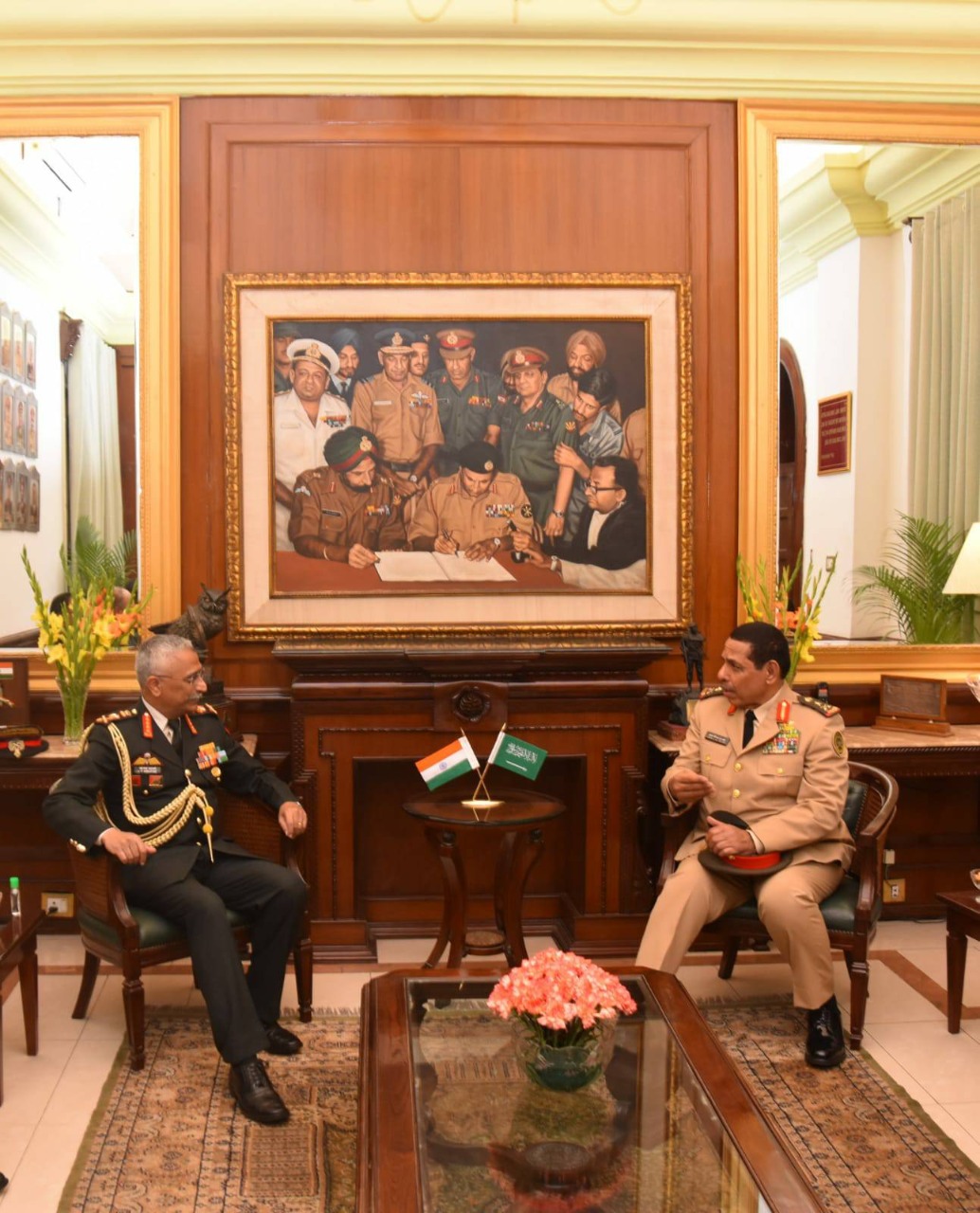
The two men are sitting in front of a framed photograph of then-Pakistani military commander General AAK Niazi signing surrender documents after losing the 1971 war that led to the creation of Bangladesh.
Indian military officials surround Niazi, who was supported by Saudi Arabia at the time.
"The Indians are suggesting that the Saudis are turning to them after being disappointed by Pakistan. But it can be seen as an insult to the Saudis, who were supporting Pakistan in that war," Karim told MEE.
'Usually the Saudis haven't asked for reciprocity, but this time around we have heard that there is no free lunch'
- Ahmed Quraishi, Pakistani broadcaster
Islamabad-based analyst Ahmed Qureshi, who is an expert on Pakistani-Saudi relations and reports for Pakistan's state broadcaster PTV, says Indian overtures to Saudi Arabia with regards to Yemen are not new.
"During [Saudi crown prince] Mohammed bin Salman's trip to India in 2019, it wasn't made public, the Indians did offer Saudi Arabia some sort of help for the Yemen conflict, this was confirmed to me by a Saudi journalist. The Saudi leadership, however, thanked India but did not respond to the offer,” Quraishi told MEE.
An English-language newspaper in Pakistan reported ongoing discussions on a visit by Saudi Crown Prince Mohammed Bin Salman to Pakistan in March, likely to coincide with the country's national day on 23 March.
The Pakistani foreign office told MEE that there was no official confirmation of the visit yet.
Pakistan's role in the Gulf
"Saudis feel that Pakistan should have a bigger role in the security of Gulf countries, something similar to Egypt," said Quraishi. "From what I know, Pakistan has agreed."
But Pakistan, Quraishi said, already has several military cooperation agreements with Saudi Arabia, some of which date back to the 1960s.
"Pakistan is also a member of the US Navy's 5th Fleet alliance, which patrols the North Arabian Ocean and the Gulf of Aden, they have repeatedly intercepted Iranian weapons bound for Yemen," Quraishi told MEE.
He added that Pakistan and Saudi Arabia have been in discussions about a possible technology transfer of Pakistan's domestically manufactured drones.
Diplomatically, Quraishi said, Pakistan has recently declared the Houthis a terrorist organisation and directly condemned Houthi missile and drone attacks.
Pakistan's historically neutral policy towards Saudi Arabia and Iran has clearly shifted.
This is partly because of the increasingly brazen attacks against Pakistani security forces by Iran-based Baloch rebels. Those attacks have seen hundreds of Pakistani soldiers killed over the last couple of years.
But Quraishi says there's another reason.
"Usually the Saudis haven't asked for reciprocity, but this time around we have heard that there is no free lunch," he said.
Earlier this year, Saudi Arabia loaned Pakistan $3bn to bolster the country's dwindling foreign exchange reserves - the loan is repayable in a year on a relatively high-interest rate of four percent.
With that kind of financial leverage at its disposal, it's no wonder Pakistan is responding to Saudi diplomacy, with the leadership in Islamabad hoping that a visit from Mohammed bin Salman will help ease Pakistan's economic woes.
Middle East Eye propose une couverture et une analyse indépendantes et incomparables du Moyen-Orient, de l’Afrique du Nord et d’autres régions du monde. Pour en savoir plus sur la reprise de ce contenu et les frais qui s’appliquent, veuillez remplir ce formulaire [en anglais]. Pour en savoir plus sur MEE, cliquez ici [en anglais].


